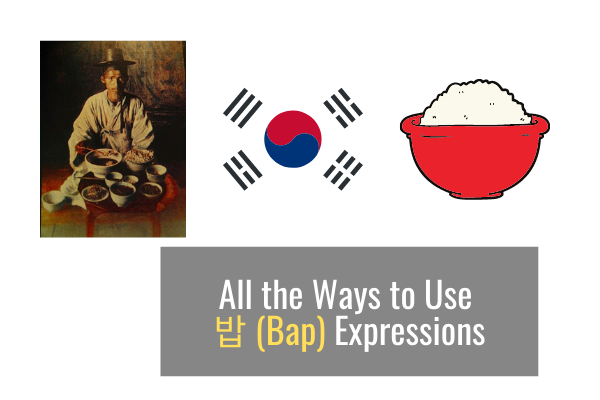This post explains the many ways Koreans use “bap” in conversation.
I go over the most common expressions and their literal and actual meanings.

Key Takeaways
- “Bap (밥)” refers to rice or meal in Korea.
- This vocabulary is used in everyday conversation from greeting to flirting.
What Does Bap (밥) Mean?
“밥 (Bap)” literally means “rice” or “meal” in Korea.
It can include cooked rice with:
- sticky rice (찹쌀)
- barley (보리)
- black rice (흑미)
- beans (콩)
- sorghum (수수)
- different millets (기타 곡물)
In Korean, it sounds more like “bob”.
But bap means a lot more than that.
It’s a central part of Korean communication.
Koreans love to eat. When you see how often they use bap in conversation, you’d think their lives revolve around it.
Although no one’s sure why Koreans use bap so often, you can imagine that with Korea’s tumultuous past, food was sometimes scarce and a cornerstone in daily life.

How Koreans Talk to Each Other with 밥 (Bap) Expressions
| Situation | What to Say | Literal Meaning | Actual Meaning |
| When greeting | 밥 먹었어? (bap meok-eo-sseo?) | Did you eat rice? | How are you? |
| 식사는 하셨습니까? (shik-sa-neun ha-shuh-sseup-ni-kka) | Did you have a meal? | How are you? (honorifics, usually for superiors) | |
| When asking how someone’s doing | 밥은 먹고 다니냐? (bap-eun meok-go da-ni-nya) | Have you been eating? | How have you been? |
| When parting/saying goodbye | 밥이나 한번 먹자 (bap-ee-nah han-beon meok-ja) | Let’s eat rice again. | See you again. |
| 나중에 밥 한번 먹자 (nah-joong-eh bap-han-beon meok-ja) | Let’s eat rice later. | See you again. | |
| When you’re grateful | 진짜 고맙다 나중에 밥 한끼 살게 (jin-jja go-map-da nah-jung-eh bap han-kki sal-keh) | Thank you so much. I’ll buy you a meal later. | Thank you so much! |
| When you dislike someone | 그 사람하곤 밥 먹기도 싫어 (geu sa-ram-ha-gon bap meok-gi-doh shi-reo) | I don’t even want to eat rice with that person. | I hate that person. |
| When persuading a friend to help you | 밥 한번 살게. 도와줘. (bap han-beon sal-keh doh-wa-jwo) | I’ll buy you a meal. Help. | Please help me. |
| When cussing | 콩밥 먹고 싶니? (kong-bap meok-go shib-ni?) | Do you want to eat bean-mixed rice? | Do you want to go to prison? |
| 쟤 진짜 밥맛없지 않냐? (jye jin-jja bap-mat eob-ji ahn-nya) | Isn’t he/she really making us lose our appetite (rice flavor)? | Isn’t he/she a jerk? | |
| 밥맛없는 놈. 잘먹고 잘살아라 (bap-mat-eob-neun nom. jal-meok-go jal-sa-ra-ra) | Jerk makes me lose my appetite (rice flavor). Eat well and live well. | Jerk. You’re on your own now. (Even though you hate someone, you wish them to eat well.) | |
| When it’s a serious situation | 넌 목구멍에 밥이 넘어가냐? (neon mok-gu-meong-eh bap-ee neom-eo-ga-nya) | Does rice go through your throat? | How can you eat in this situation? |
| When you’re trying to stop someone | 그게 밥 먹여주냐? (geu-geh bap meok-yeo-ju-nya) | Does that feed you? | You don’t need to do that. |
| When you’re being sarcastic about someone | 밥만 잘 쳐먹더라 (bap-man jal cheo-meok-deo-ra) | He/she was eating rice well. | Wow, he/she is living well (sarcastically). |
| When someone looks pathetic | 저래서 밥은 벌어먹겠냐? (jeo-rae-suh bap-eun beol-eo meok-get-nya) | Could he/she earn a meal like that? | Could he/she make a living like that? |
| When someone is taking someone’s glory | 다 된 밥상에 숟가락을 얹는다 (dah-doen bap-sang-eh sud-ga-rak-eul eon-neun-da) | Put a spoon on the set table. | If ‘you’ are the one putting the spoon, you’re being humble and praising someone who’s done/achieved something. If ‘another person’ is the one placing the spoon, you’re criticizing him/her for taking your glory without adding any effort. |
| When someone needs to do something well | 사람이 밥값은 해야지 (sa-ram-ee bap-gab-seun hae-ya-ji) | A person should be worth the price of rice. | Someone needs to earn what they’re getting paid. |
| When you’re at someone’s house briefly and about to leave | 왜 벌써 가? 밥이라도 먹고 가지 (weh beol-sseo-gah? bap-ee-ra-doh meok-go gah-ji) | Why are you leaving already? You should eat something before you go. | It’s just a polite expression. You don’t have to eat. |
| When parents are scolding | 밥도 없을 줄 알아! (bap-doh eob-seul-jul al-ah) | There will be no rice for you! | You should still eat. If you don’t eat, mom will get angrier. |
| When kids are angry | 나 오늘 밥 안먹어! (nah oh-neul bap ahn-meok-eo) | I’m not eating rice today! | Again, they should still eat. |
| When flirting | 저랑 밥 한번 드실래요? (jeo-rang bap han-beon deu-shil-lae-yo) | Would you like to eat rice with me? | Would you like to go out with me? |
| When someone’s sick | 밥은 꼭 챙겨 먹어. (bap-eun kkok chaeng-gyeo meok-eo) | Make sure to eat rice. | Take care. Get well. |
Proverb about Eating Rice
| Korean Proverb | Literal Meaning | Actual Meaning |
| 먹고 죽은 귀신이 때깔도 곱다. | A ghost who dies after eating has color and charm. | Eat a lot. |
| 금강산도 식후경 | Food before Mt. Geumgang | Pudding before praise (you’ll appreciate even the most beautiful scenery with a full stomach). |
| 밥 먹을 때는 개도 안 건드린다. | You don’t bother even a dog when they’re eating. | Don’t nag while someone’s eating. Let them eat. |
| 다된 밥에 재뿌린다. | Sprinkle ash over finished rice | Don’t rain on someone’s parade |
| 죽이 되든 밥이 되든 | Whether it becomes porridge or rice | Sink or swim |
| 한국인은 밥심으로 산다 | Koreans live with rice power. |
Did we miss anything?
Bap is an important part of how Koreans communicate.
Now we want to hear from you.
Let us know your favorite bap-related expression in the comments!


![137 Konglish Words You Shouldn’t Live Without [with Examples]](https://linguasia.com/wp-content/uploads/137-Konglish-Words-You-Shouldnt-Live-Without-200x130.png)


